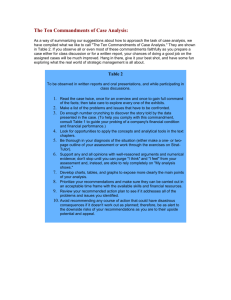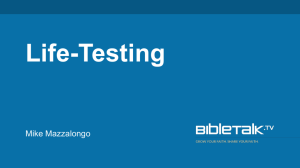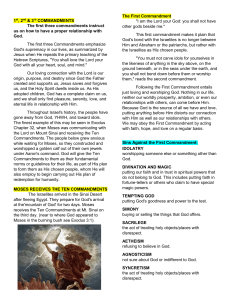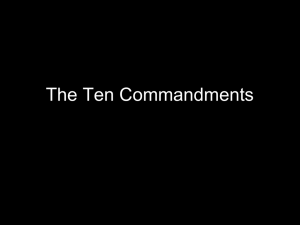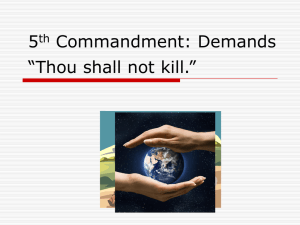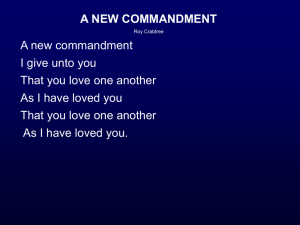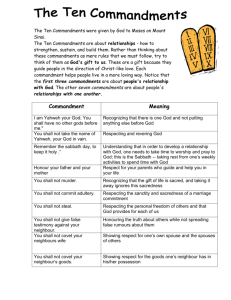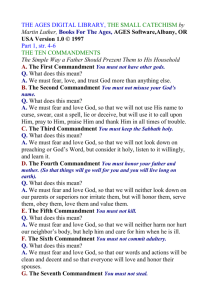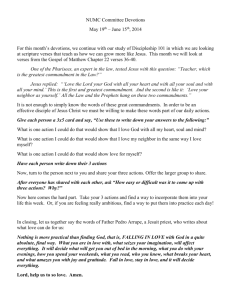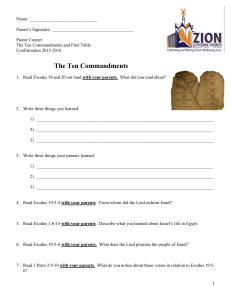“God and Only God” Ten Commandments, Part 1 Exodus 20:1
advertisement
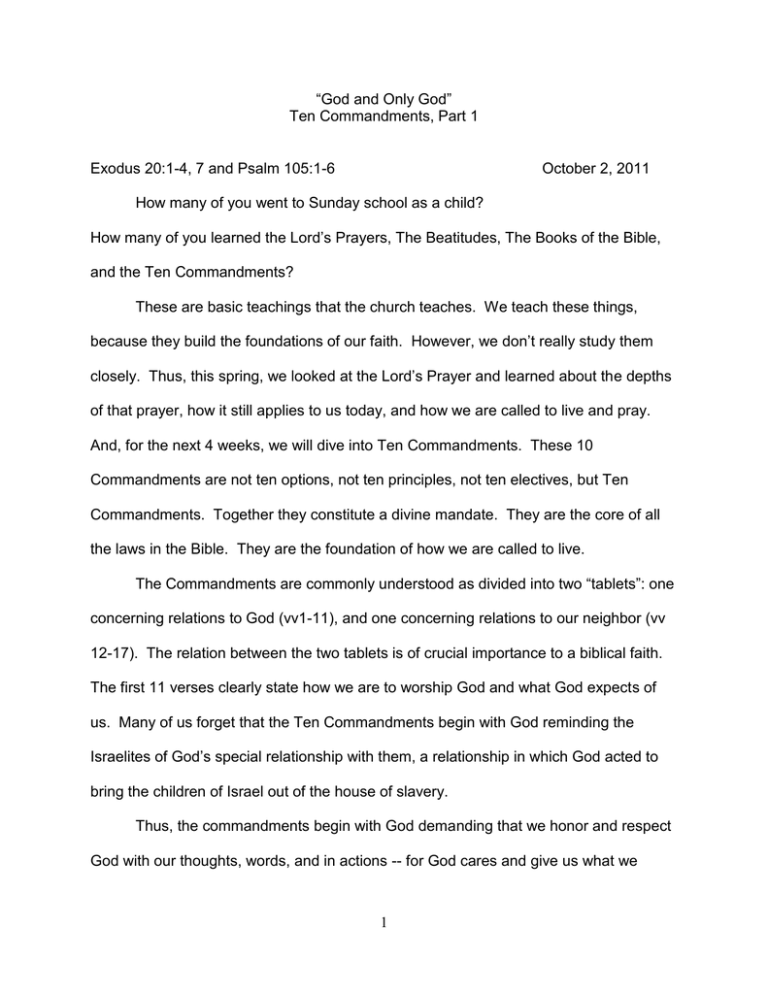
“God and Only God” Ten Commandments, Part 1 Exodus 20:1-4, 7 and Psalm 105:1-6 October 2, 2011 How many of you went to Sunday school as a child? How many of you learned the Lord’s Prayers, The Beatitudes, The Books of the Bible, and the Ten Commandments? These are basic teachings that the church teaches. We teach these things, because they build the foundations of our faith. However, we don’t really study them closely. Thus, this spring, we looked at the Lord’s Prayer and learned about the depths of that prayer, how it still applies to us today, and how we are called to live and pray. And, for the next 4 weeks, we will dive into Ten Commandments. These 10 Commandments are not ten options, not ten principles, not ten electives, but Ten Commandments. Together they constitute a divine mandate. They are the core of all the laws in the Bible. They are the foundation of how we are called to live. The Commandments are commonly understood as divided into two “tablets”: one concerning relations to God (vv1-11), and one concerning relations to our neighbor (vv 12-17). The relation between the two tablets is of crucial importance to a biblical faith. The first 11 verses clearly state how we are to worship God and what God expects of us. Many of us forget that the Ten Commandments begin with God reminding the Israelites of God’s special relationship with them, a relationship in which God acted to bring the children of Israel out of the house of slavery. Thus, the commandments begin with God demanding that we honor and respect God with our thoughts, words, and in actions -- for God cares and give us what we 1 reflect. We also must spend time with God and renew our spirit. We need to stop and feel God’s presence in our lives and in our world. In order to do so, we need to rest and be one with God through prayers, praise and the words of God. Now, the second tablet is not just a set of good moral ideas. It is not just what we should not do but it contains conditions of viable human life, non-negotiable conditions rooted in God’s own life and God’s ordering of the world. These set of laws demands that we respect and more importantly honor other beings’ life and their belongings, no matter who they are. We have responsibilities to others because they are God’s gift. We cannot live by our own selfish desires but are to care and honor other beings. We cannot live to gain power or wealth for ourselves, neglecting others. Today, we will start with the most important law, the law that serves as the heart of the Ten Commandment. The first commandment states clearly who God is and what God asks of us: “I am the Lord your God, who brought you out of the land of Egypt, out of the house of slavery; you shall have no other gods before me.” God wants total loyalty, commitment and faith because it is God who has saved us from our pain and suffering. As it says in Deuteronomy 6:5, “You shall love the LORD your God with all your heart, and with all your soul, and with all your might,” we are to have faith and love of one God. God who was willing to come as Jesus Christ to redeem us. God who came to bring healing and restore our souls. Like the Israelites, we all know about the suffering and struggles of life. We all have suffered, felt trapped, in pain, and have been lost. We have cried out to God in our Egypt time and time again, God has heard our cry and helped us out of our own Egypt. The God we have is the God who hears our pain, who brings comfort, and who 2 helps us out of it. Thus, God demands that we put only this God in our lives, that we do not fill our lives with other gods. God does not want us to turn to others things to fill our void and pain because nothing else can give us what we truly need; only God can. However, like the Israelites who had made golden calf and other small gods, we too have created our gods today. We may not have small wooden idols to worship in our houses, but we have material possessions that we worship more than God, such as money, homes, cars, retirement accounts, and bank accounts. Martin Luther said that our god was anything that we fear, love and trust above all things. This is why we have the second commandment: “You shall not make for yourself an idol, whether in the form of anything that is in heaven above, or that is on the earth beneath, or that is in the water under the earth.” God knows that we have this tendency to search for other gods instead of trusting and staying faithful to the God who freed Israelites, and who frees us. God also knows that it is difficult for us to completely give our lives over to God. Instead of following God, we want to lead. Instead of submitting, we want to control. As God pulls us steadily and faithfully forward, we lurch to the right and we lurch to the left. We dig in our heels. We are not satisfied to move in God's direction, but are determined to move in our direction. And by doing so, we have scars to prove what kind of life we have because we have not followed the first commandment, “You will have no other gods before me” and have not followed the second command, but created our own idols to follow. But, if we put God first in our lives, then God promises that our lives will be taken care of. We will have harmony with God, harmony with our families, with our neighbors, with ourselves, and with our world. 3 We will see that the idols we worship cannot truly fill what we are looking for or help us find happiness and peace. Those idols will not give us sense of purpose or worth. Only God can! Now the Third Commandment follows the theme of respect and loyalty to God. “You shall not make wrongful use of the name of the Lord your God, for the Lord will not acquit anyone who misuses his name.” However, often we have misunderstood and misused this commandment. Most often we interpret as for us not to use “bad” or vulgar language. But what this commandment is truly about is not using God for our own gain and power. We are not to invoke God to justify our actions or desires such as when Pat Roberts asked people to send him money because God wanted him to build God’s church. Or, when Oral Roberts said that God had told him that unless he raised 8 million dollars in the next few months then God would “call him home.” Or when people evoke God’s name to further their political agenda or to increase their power and influence. Yet, it goes deeper than this. When people claim to speak for God to declare God’s judgment or punishment on those who are different than they are, then God’s name is being taken in vain. When people state that a storm, earthquake, or act of terrorism was caused by God to punish us for our evil ways, God’s name is being taken in vain. Yet, before we begin to think that such violations of this commandment are limited to politicians and televangelist, we must remember every time any of us use God as an excuse to exclude or hate another, or to get a head in the world, then we are breaking this commandment. Anytime we make the assumption that God is on our side, thus our actions are justified, we break this commandment. We who live in a nation which places “in God we trust” on our coins, must always be alert that we do not use 4 God to justify our actions, policies, or lifestyle. We must always be cautious not to equate “the American way of life” or “the American dream” with the will of God. For when we do, we are not really trusting in God, but are breaking this commandment. As we know, throughout centuries, we Christians have killed, destroyed, and brought wars in the name of God. We have used God to justify our actions and to have power over others. Instead, we are to use God’s name in prayer and praise. We are to come before God humbly, seeking God’s direction. We are to raise God’s name in thanksgiving for our blessings, and then share those blessings with others. That is what this third commandment is all about. So, let us remember, worship, and honor God who is with us now and forever. Let us live, remembering these commandments, making them part of every moment of our lives. Amen. 5
